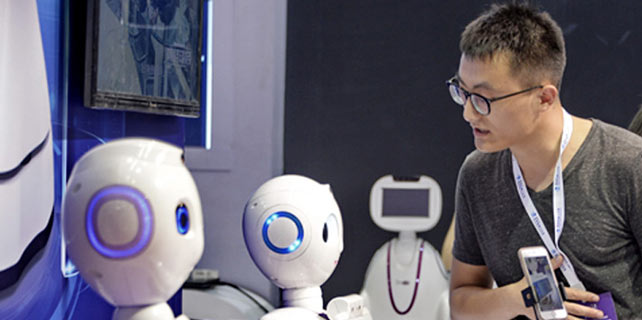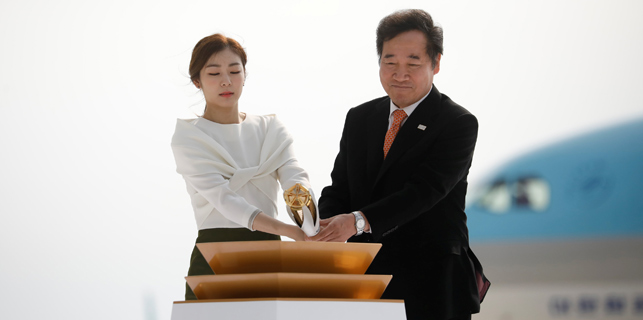Brewing a great novel story in coffee
Having a cup of coffee outside the home has become a lifestyle for many. Nespresso executive Roger Staeheli tells Sophie He HK's compactness has helped to make their brand a standout.
Having a cup of coffee at first light is no longer seen as a daily urge for many people, particularly in a jam-packed and stressful city like Hong Kong. It has somewhat become a way of life as affluence grows, and one of the world's big names in beverages is well groomed to take that culture to new heights.
Nespresso - the brand name of Swiss food-and-beverage titan Nestle Group - has been a part of the revolutionary concept sweeping the coffee industry, having started off as a pioneer more than 30 years ago.
"We were launched in Switzerland with a very simple vision to reproduce the same coffee experience of a coffee shop at home," says Roger Staeheli, Hong Kong and Macao manager for Nespresso.
The company came up with the idea of portion coffee and, 30 years ago, that was a real revolution in the business as coffee at that time was mainly instant or traditional restaurant coffee.
"Coming up with the portion concept was a revolution. When we look at this today, starting off as a pioneer in the industry and becoming the global icon of portion coffee, it's something that's very meaningful," Staeheli tells China Daily.
By the latest count, Nespresso has taken 55 countries by storm, owning some 500 boutique stores around the world.
The company began testing Hong Kong waters 20 years ago, naming an agent initially and focusing on the business-to-business (B2B) side, carrying out professional solutions and catering mainly to offices, hotels and restaurants.
Nespresso set up a subsidiary in Hong Kong in 2004 and opened its first boutique store in the city three years later at ifc mall in Central, followed by another at Elements Hong Kong - a posh shopping complex in Tsim Sha Tsui. Today, it has three boutique stores, plus a number of pop-up outlets across the city.
Staeheli says they're also offering their products through e-commerce, a field that has grown by leaps and bounds in Hong Kong and on the Chinese mainland.
"Although e-commerce takes up a relatively small part of our business for the time being, Hong Kong is a traditional retail-oriented city. E-commerce is clearly one of the channels that have been growing the fastest over time for us."
'Out of home' business
The company has kept the professional side of its business, caring for offices, hotels and cafes.
Staeheli sees the city's coffee industry as mainly an "out of home business" in line with the local lifestyle of consumers having coffee away from home to avoid the cramped environment in most Hong Kong apartments.
He was at pains to stress the rapid transformation of the local coffee trade, with quality becoming a bigger issue and consumers wanting to know more about their mouthful of coffee.
"Coffee is no longer just a function drink, just to give you a boost in the morning. It has become something that consumers want to indulge themselves in."
As a global brand, Nespresso is trying to offer the same experience for all consumers around the world. What has made the product more successful in Hong Kong, according to Staeheli, is actually the city's compact size, with most people living in small apartments, fueling the urge for them to go out and be seen having a cup of fine coffee.
Nespresso Hong Kong recently launched its lowest priced and smallest coffee machine, the Essenza Mini, for HK$988.
"Launching a small machine like we did in July, with a very small footprint but being able to offer very high quality coffee, is something that makes it more interesting for us."
As for the mainland, the company sees a big difference in consumer behavior between those in first-tier cities and people in the countryside.
"What we can see from the local market is that people usually drink coffee with milk - the vast majority of them drink coffee as a recipe of latte macchiato or cappuccino, so local consumers tend to go for more intense coffee to go along with the milk, like having a stronger cappuccino or latte," says Staeheli.
Even in Hong Kong, he notes, there're very distinct consumer groups - those living on Hong Kong Island are normally more Westernized compared to people in Kowloon or the New Territories, where they opt for a more traditional lifestyle.
And, there's a very rapid transformation of the coffee industry in Hong Kong and on the mainland, as consumers become more interested in the story of coffee, such as its origins.
"It's very similar to what happened in the wine business where, for many years, the industry was about labels, selling names and big-ticket items. And now, consumers see wine as an everyday beverage," says Staeheli.
Nespresso's business model relies on three key pillars, according to Staeheli.
The first is the exceptional quality of coffee, and what the company is doing in the industry is very unique - having a direct relationship with more than 70,000 farmers worldwide.
"We know these farmers, we know what we're buying from them, we know the quality of the products. We also have full control over the value chain, all the coffee is processed in our three factories in Switzerland, where the coffee is roasted, blended and put into capsules."
The second pillar is innovation on a regular basis. Nespresso is innovating its products, believing it's very important to keep up that pace in order to maintain a leading position in the market.
"Innovation is something very important, and it's expected from the consumer, people in Hong Kong and on the mainland that they like to see novelties, they like to see change," stresses Staeheli.
The third mainstay concerns services, which are very important not just for in-home business, but also for out of home business, and that's astutely applied in Hong Kong.
Contact the writer at sophiehe@chinadailyhk.com









